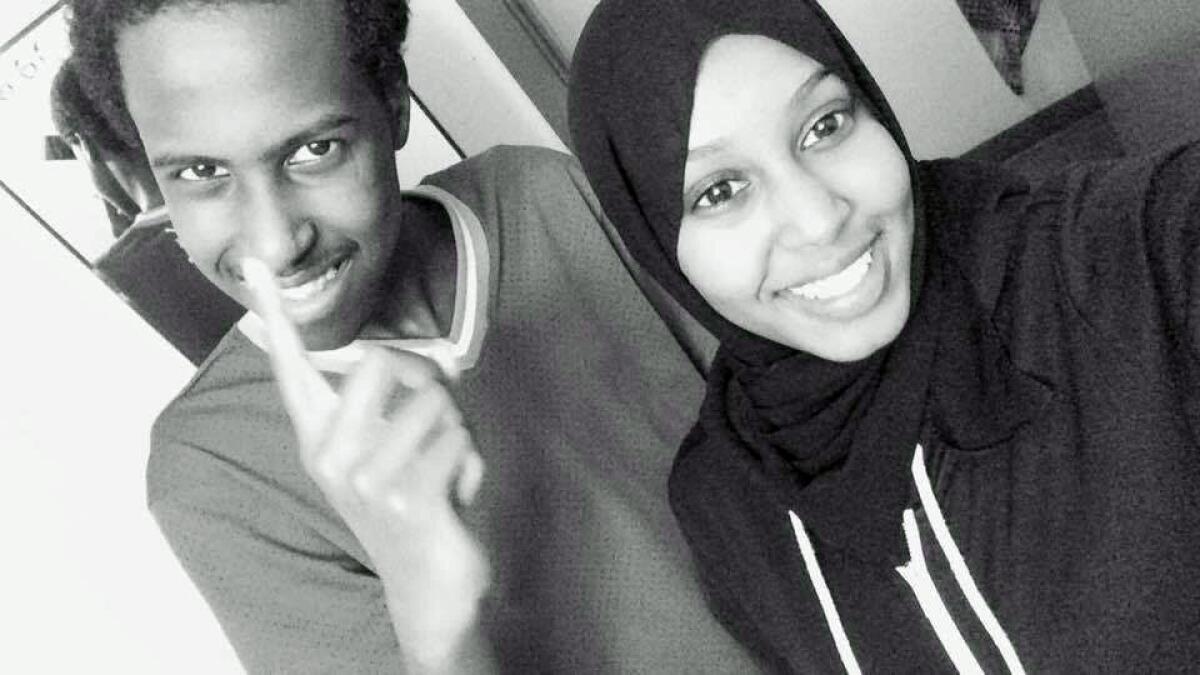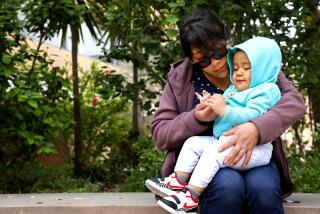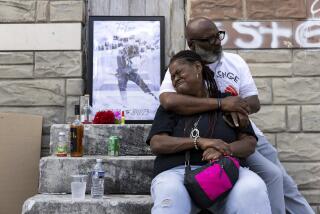Somali American teen’s unexplained death rattles Muslims and blacks in Seattle

Seattle student Hamza Warsame, 16, left, with his sister, Ifrah Warsame, in 2015.
- Share via
He had almost memorized the entire Koran.
That’s what Hamza Warsame’s friends and family in Seattle’s Somali American community come back to again and again: Hamza, just 16, was only one sura, or chapter, away from finishing Islam’s central text.
He was a great studier. The American-born son of two refugees from Somalia, Hamza dreamed of studying computer science at MIT. He was already taking classes at Seattle Central College, which is where he said he was headed the last time his family saw him, on Dec. 5.
Even for someone as diligent as Hamza, his plans that day were unusual. He never left home on a Saturday to study at school, his sister Ikram Warsame recalled.
As he left around 2:40 p.m., his family — doing what families do with children everywhere — reminded Hamza to come home safe.
But he never made it back. About an hour after saying goodbye, his sister said, Hamza was found dead on the sidewalk in front of a classmate’s apartment, where investigators said he had plummeted from a balcony.
Hamza’s death has become the worst kind of mystery for Seattle’s black Muslim community, causing grief and suspicion over the loss of one of its most promising at a time when American Muslims have felt new fears for their own safety.
As of Thursday, officials had yet to release a cause or manner of death — whether it was an accident, suicide, homicide or something else — and were still awaiting the results of an autopsy and toxicology report.
Join the conversation on Facebook >>
The lack of certainty around Hamza’s death has been met with skepticism in Seattle’s Muslim and East African immigrant communities, fed in part by fears of anti-Muslim hate crimes after recent terrorist attacks by Muslim extremists in Paris and San Bernardino.
Hamza’s identity as a Muslim Somali American also marks a fusion of two of America’s most visible and potentially vulnerable minorities. Protests since his death demanding greater visibility have drawn not just chants of “Black lives matter,” but “Muslim lives matter” too.
I can see where the rumors would come from.... I would hope my brother didn’t die from someone’s ignorance.
— Ikram Warsame, Hamza Warsame’s sister
“He’s a black Muslim, so it’s like a double whammy,” said a family friend, Ahlaam Ibraahim, 17, whose hijab has drawn suspicious stares from strangers in recent weeks, making it feel unsafe to travel alone.
“People in our community don’t feel safe ... then Hamza’s death happened.”
Those community fears took flight in a widely spread rumor on social media that Hamza had been beaten and thrown to his death in a hate crime, which police have discounted.
“Right now, there is no evidence that would suggest any injuries consistent with any type of altercation prior to the fall,” Sgt. Sean Whitcomb, public affairs director of the Seattle Police Department, told The Times on Thursday.
The source of the rumor has not been identified, and Hamza’s family members have disavowed it, urging the community not to make hasty judgments. Still, they remain concerned.
“I can see where the rumors would come from,” said Ikram, an 18-year-old student at the University of Washington Bothell. “We don’t have proof; we don’t have anything from the Seattle Police Department. I would hope my brother didn’t die from someone’s ignorance.”
Hamza’s family initially had trouble getting information from the police the day he died, said a cousin, Mumin Dimbil, 45, a family physician in Seattle’s suburbs.
“We went home that night not knowing anything about what happened — no briefing, nothing. That was the hardest part,” Dimbil said.
Four days after Hamza’s death, Seattle police put out a statement in English and Somali acknowledging “community concerns about the case” and announcing the appointment of Assistant Police Chief Robert Merner to oversee the investigation. In a meeting the following day, Dimbil said Seattle police apologized to the family for a lack of transparency.
Hamza’s parents were refugees who came to the U.S. in the 1990s to flee the war in Somalia, said Dimbil. They joined the 40,000 East African immigrants and refugees who have settled in Seattle and its suburbs.
Hamza was the middle child of five children. He rarely left home except to go to school or to play basketball, and his father had rewarded his straight A’s with a PlayStation 4, and other achievements in school with an iPhone 6, said his oldest sister, Ifrah Warsame, 20.
She described her brother as the family member who would always check in to make sure everyone was OK.
See the most-read stories this hour >>
That leaves the puzzle of why Hamza ended up at an apartment building when he told his family he was heading to Seattle Central College.
Two or three weeks before Hamza died, he’d asked his father if he could go to one of his community college classmate’s apartments to work on a class project, said Dimbil.
His father said no, he was too young, said Dimbil.
In the last week of his life, Hamza had been monitoring reports of Islamophobia around the U.S., recalled a cousin, Mohamed Abdi, 19.
“We felt like Muslims and blacks were being targeted in America right now, and how there’s this hate,” Abdi said.
The last time Abdi saw Hamza was a little more prosaic. They had just finished playing basketball, and they gave each other a hug and their usual farewell, wishing each other peace in Arabic.
“As-salaam alaikum. Take care, Hamza,” Abdi recalled saying.
“Wa-alaikum salaam. You too, brother,” Hamza replied. The next day, he was gone.
Twitter: @MattDPearce
ALSO
Inside President Obama’s shift on how to curb gun violence
Bernie Sanders loses access to crucial voter data after aide is caught prying into Clinton files
Are the secret Planned Parenthood videos protected under the 1st Amendment?
More to Read
Sign up for Essential California
The most important California stories and recommendations in your inbox every morning.
You may occasionally receive promotional content from the Los Angeles Times.











